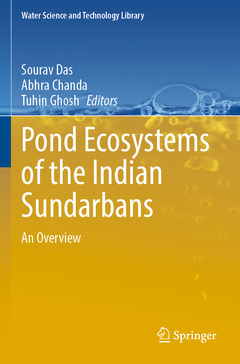Description
Pond Ecosystems of the Indian Sundarbans, 1st ed. 2022
An Overview
Water Science and Technology Library Series, Vol. 112
Coordinators: Das Sourav, Chanda Abhra, Ghosh Tuhin
Language: English
Subjects for Pond Ecosystems of the Indian Sundarbans:
Publication date: 10-2022
270 p. · 15.5x23.5 cm · Paperback
Publication date: 10-2021
270 p. · 15.5x23.5 cm · Hardback
Description
/li>Contents
/li>Biography
/li>Comment
/li>
This book aims to give a holistic overview of the pond ecosystem of Indian Sundarbans. Due to climate change, the Indian Sundarbans faces several challenges. With rising sea levels, islands are disappearing and the increasing salinity in the water and soil has severely threatened the health of mangrove forests and the quality of fresh water, soil and crops. Additionally, there have been serious disturbances to hydrological parameters in the lotic as well lentic ecosystems.
This book provides new insights into lentic ecosystem-oriented research in the deltaic ecosystem of GBM-I (Ganga-Brahmaputra-Meghna, Indian Delta). The major findings from various research works are brought together, and the gaps and future possible ways forward are outlined. The book addresses the SDG 6 (Clean Water and Sanitation), SDG 13 (Climate Action) and SDG 14 (Life below Water), with a focus on the ecosystem services of ponds in the Indian Sundarbans.Despite there being many studies on riverine water, ground water and mangrove ecosystems of the Indian Sundarbans, this book offers new insights into the pond ecosystem of the Indian Sundarbans.
The outcomes from this book can be utilized by researchers from the inland fisheries sector, environmental managers, professionals, and those who seek to develop ways for making pond ecosystems sustainable.
Preface
Chapter 1: Introduction - Ponds of Indian Sundarban as an important socio-ecological systems
Sourav Das, Jadavpur University, Kolkata, India
Chapter 2: Assessment of Pond water quality and its impact on health and local livelihood in the Indian Sundarban
Sourav Das, Jadavpur University, Kolkata, India
Chapter 3: Role of Fe2+ on the enhancement of Phytoplankton Community in pond system of Indian Sundarban
Abhra Chanda Jadavpur University, Kolkata, India
Chapter 4: Role of controlled lime treatment on the productivity of pond ecosystem
Abhra Chanda Jadavpur University, Kolkata, India
Chapter 5: Ecosystem services of pond and the linkage with SDGs – Indian Sundarban
Somnath Hazra, Rabindranath Bhattacharjee , Jadavpur University, Kolkata, India
Chapter 6 Climate Change Effects and Mitigation Strategies
Somnath Hazra, Rabindranath Bhattacharjee, Jadavpur University, Kolkata, India
Chapter 7 Conclusion and Future Prospects
Sourav Das , Jadavpur University, Kolkata, India
Index
Dr. Sourav Das is a Post-Doctoral Research Associate of the UKRI-GCRF Living Deltas Hub in the School of Oceanographic Studies at Jadavpur University, India. His research interests include biogeochemistry of marine and coastal water, ocean remote sensing, optical properties of water (inherent & apparent optical properties), and air quality monitoring. He has twelve years research experience and has more than 60 research articles in reputed peer reviewed journals including two books.
Dr. Abhra Chanda is an Assistant Professor, School of Oceanographic Studies at Jadavpur University, India. His research interest encompasses biogeochemistry of lentic and lotic aquatic systems and pollutant dynamics. Blue carbon dynamics is one of the priorities of his research. He has eleven years research experience and has more than 75 research articles in reputed peer reviewed journals to his credit.
Prof. Tuhin Ghosh is Professor and Director of the School of Oceanographic Studies at Jadavpur University, India. He has more than two decades of research experience in coastal geomorphology, disaster management, climate change impacts, adaptation strategies, and human migration. He has more than 80 research articles in reputed peer reviewed journals to his credit.
Offers a unique approach to the study of lentic ecosystem of the Indian Sundarban
Provides detailed descriptions of the pond ecosystem as an important socio-ecological system
Includes a chapter dedicated to the controlled lime treatment and reduction of CO2 emissions




